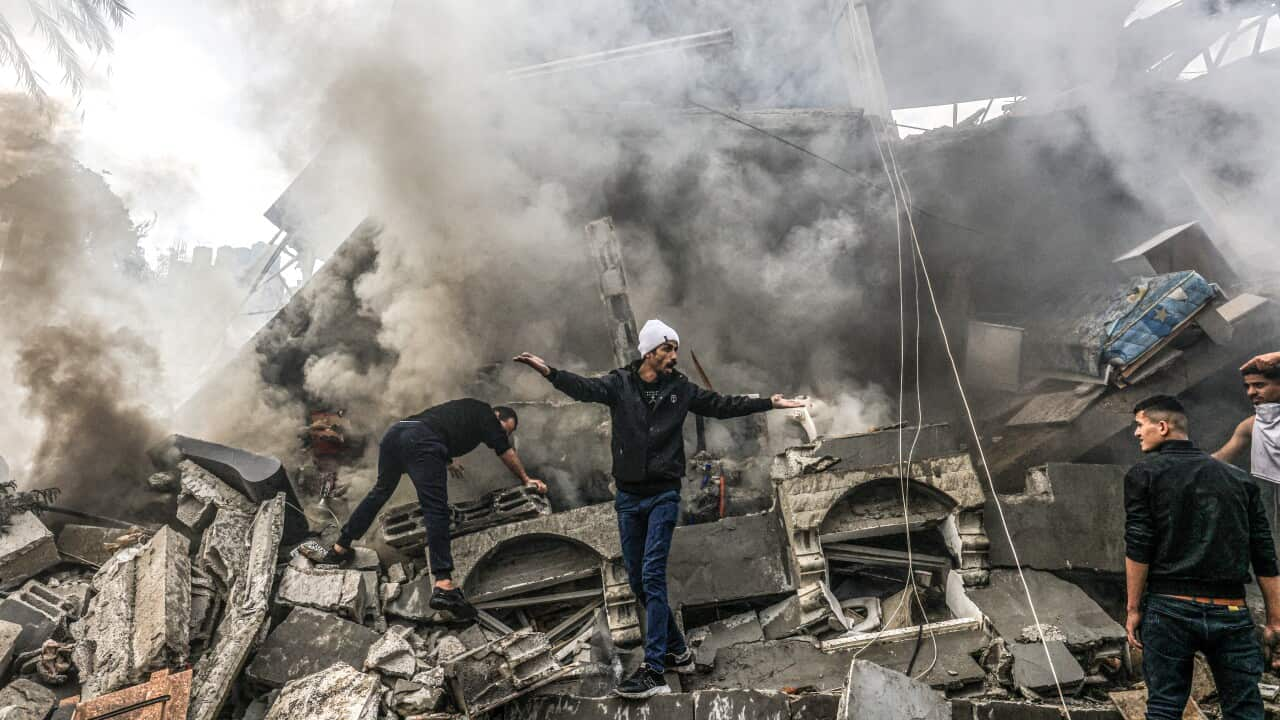Key Points
- The United Nations warns of a "breakdown of civil order" in Gaza.
- Aid organisations are struggling to get supplies to Gazans under Israeli bombardment.
- Israeli Prime Minister Benjamin Netanyahu has brushed off appeals for a ceasefire.
Hunger and desperation are driving people to seize humanitarian aid being delivered to the Gaza Strip, the United Nations said, warning of a "breakdown of civil order".
International aid organisations have under Israeli bombardment, with the Rafah crossing in Egypt the only point of entry.
Israel has reopened the Kerem Shalom crossing as an inspection checkpoint to increase the amount of aid reaching the Palestinian territory, but the UN warned this was not enough.
"Everywhere you go people are desperate, hungry, and are terrified," said Philippe Lazzarini, the head of the UN agency for Palestinian refugees, at a press conference in Geneva.
"We are teetering on the edge of a possible implosion. We might reach our limit. Why? Because there is more and more a breakdown of civil order."
Lazzarini, who has just returned from Gaza, said — something he described as "completely new" in the Palestinian territory.
But he said he hadn't heard of any UN or UNRWA trucks being hijacked by Hamas.
"This has nothing to do with aid diversion. This has to do with a total despair," he said, adding that many people UNRWA had met hadn't eaten for one, two or three days.
The war was triggered by an unprecedented attack on Israel launched by Hamas militants on 7 October from the Gaza Strip, killing about 1,200 people, mostly civilians, and taking around 240 hostages, according to Israeli officials.
Aiming to eliminate Hamas, Israel launched a retaliatory military offensive in Gaza that has killed more than 18,700 people, according to the Hamas-run territory's health ministry.
Nearly all of Gaza's 2.3 million residents have been forced from their homes, many several times.
The significant escalation is the latest in a long-standing conflict between Hamas and Israel.
"With this growing despair, our operating environment becomes more and more difficult," Lazzarini said, adding that the "little aid trickling into Gaza" did not match the "immensity of needs".
He called for a large-scale increase in aid deliveries as the only way, in the absence of a ceasefire, to help alleviate the situation in Gaza.

Palestinians wave their identity cards as they gather to receive flour rations for their families outside a warehouse of the United Nations Relief and Works Agency for Palestine Refugees (UNRWA) in Rafah in the southern Gaza Strip Tuesday. Source: Getty, AFP / Mohammed Abed
The more than two-month-old war is now raging across the entire Palestinian enclave, causing a humanitarian catastrophe, with little end in sight.
"It will last more than several months - but we will win and we will destroy them," Israeli Defence Minister Yoav Gallant told visiting White House national security adviser Jake Sullivan.
He, in turn, met Prime Minister Benjamin Netanyhahu and spoke with Israeli officials about possibly transitioning to "lower-intensity" military operations in Gaza, the White House said, without putting any timeframe on that.
The New York Times, quoting unidentified United States officials, said the White House told Israel to end its large-scale ground campaign in Gaza around the end of the year and transition to a more targeted phase employing elite commandos.

Israeli soldiers are seen at a staging area near the Israel-Gaza border, in southern Israel, on Thursday. Source: AAP, AP / Leo Correa
With the war's consequences escalating fast, Israeli Prime Minister Benjamin Netanyahu has so far brushed off appeals for a ceasefire.
Washington has provided diplomatic cover for its longstanding ally but expressed increasing alarm, with









